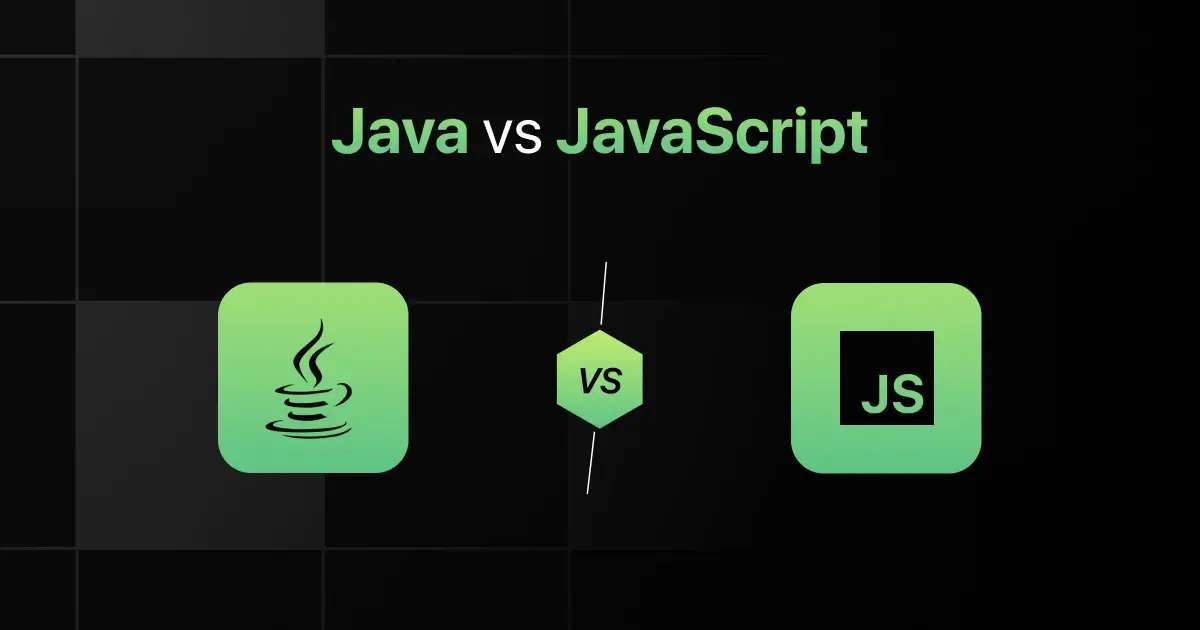Java vs JavaScript: Key Differences

When comparing Java and JavaScript, it’s important to look at what sets them apart. The discussion about Java vs JavaScript is common among programmers deciding which language to use for their projects.
The question of Java vs JavaScript which is better? or Java vs JavaScript which is best? depends on what you need for your specific project.
In this article, let’s know the differences between Java vs JavaScript.
Java vs JavaScript: Understanding the Key Differences
When comparing Java and JavaScript, it’s crucial to understand the key distinctions that define their usage and capabilities.
One of the most important differences is that Java is a statically typed, general-purpose programming language ideal for server-side applications, whereas JavaScript is a dynamically typed language primarily used for client-side scripting in web browsers.
The following are other major differences between Java and Javascript:
| S. No. | Parameters | Java | Javascript |
|---|---|---|---|
| 1 | Developed By | Sun Microsystems (now owned by Oracle) | Netscape (now maintained by Mozilla) |
| 2 | Release Year | 1995 | 1995 |
| 3 | Paradigm | Object-oriented, class-based, concurrent | Object-oriented, imperative, functional |
| 4 | Syntax | C++-like syntax, strict typing | C-like syntax, loosely typed |
| 5 | Performance | High, due to JIT compiler and optimizations | Generally lower, dependent on the browser's engine |
| 6 | Applications and Use Cases | Enterprise applications, Android apps, web server apps | Web development, front-end scripting, server-side (Node.js) |
| 7 | Learning Curve | Steeper due to strict type system and verbose syntax | Easier to start with due to simpler syntax and flexibility |
| 8 | Libraries and Frameworks | Rich set of libraries and frameworks like Spring, Hibernate | Extensive range of libraries and frameworks like React, Angular, Node.js |
| 9 | Platform Independence | Runs on any machine with a JVM | Runs on any modern web browser |
| 10 | Concurrency and Multithreading | Built-in support with multithreading | Single-threaded with event-driven and asynchronous programming |
| 11 | Tooling and IDE Support | Extensive support with IDEs like Eclipse, IntelliJ IDEA | Good support with IDEs like Visual Studio Code, Atom |
| 12 | Memory Management | Automatic garbage collection, managed by JVM | Handled by the browser, less control for the developer |
| 13 | Error Handling | Strong error handling with exceptions | Uses try-catch, but less structured error-handling |
| 14 | Security | More secure due to JVM which restricts many operations | Less secure inherently, but modern improvements like Content Security Policy (CSP) help |
| 15 | Scalability | Highly scalable due to mature ecosystems like Java EE | Scalable with the use of modern back-end technologies like Node.js |
| 16 | Key Features | Strong memory management, high performance, robust security | First-class functions, dynamic typing, prototype-based inheritance |
| 17 | Integration with Other Technologies | Easily integrates with technologies used in enterprise environments | Integrates well with web technologies and diverse APIs |
| 18 | Community and Support | Large, mature community with extensive documentation and support | A very large, vibrant community, especially on the web |
| 19 | Job Opportunities | Consistently high demand in enterprise, mobile, and large systems | High demand in web development, both front-end and server-side |
| 20 | Future Prospects | Stable with incremental advancements, expanding in the IoT sphere | Continuously growing, especially with the expansion of web technologies and IoT |
Java vs JavaScript: Which One to Choose?
Choosing between Java and JavaScript can be challenging, but by understanding their distinct advantages, you can make an informed decision.
Choose Java If:
- You aim to work as a backend developer, mobile app developer, or enterprise-level software engineer, particularly in large corporations and tech companies that rely on Java for its robustness.
- You seek a language with comprehensive libraries and frameworks, such as Spring and Hibernate, that are essential for enterprise and Android application development.
- You value a language known for its high execution speed, efficiency, and extensive memory management capabilities, making it ideal for high-load systems and large-scale applications.
- You need a universally compatible language that supports a wide range of platforms from enterprise servers to mobile operating systems through its Java Virtual Machine (JVM).
- You focus on developing large-scale enterprise systems, Android applications, and server-side technologies, where Java’s scalability and reliability are unparalleled.
Choose JavaScript If:
- You aim for roles such as web developer, UI/UX developer, or mobile app developer, especially in startups, digital media agencies, and tech companies focusing on rapid deployment and prototyping.
- You appreciate a language with a massive ecosystem of libraries and frameworks like React, Node.js, and Express, which facilitate quick development across a range of applications from servers to client-side interfaces.
- You prioritize a language renowned for its fast execution speeds necessary for real-time web applications and dynamic website content, optimizing both time-to-interactive and overall user experience.
- You require a universally supported language that operates natively on all modern browsers and platforms, making it the standard choice for client-side scripting.
- You work on dynamic web projects, interactive websites, and real-time applications that benefit from JavaScript’s event-driven non-blocking architecture, making it ideal for tasks requiring high user interaction and data updates.
Final Words
The main difference between Java and Javascript lies in their design and use.
The purpose of understanding the Java vs Javascript difference is to choose the right tool for the job, depending on factors like the project’s size and how easy it is to maintain.
Explore More Java Resources
- Java Learning Websites
- Java Practice Websites
- Java YouTube Channels
- Java Project Ideas
- Java Apps
- Java IDEs
- Java MCQ
Explore More JavaScript Resources
- JavaScript Learning Websites
- JavaScript Practice Websites
- JavaScript YouTube Channels
- JavaScript Project Ideas
- JavaScript Apps
- JavaScript IDEs
- JavaScript MCQ
Explore More Comparisons
FAQs
The key differences between Java and Javascript are:
- Java syntax is influenced by C++, making it more structured; JavaScript’s syntax is more flexible and adapted for easier web integration.
- Java is statically typed whereas JavaScript is dynamically typed.
- Java code runs on any device with a JVM (Java Virtual Machine); JavaScript code primarily runs in web browsers.
- Java uses multithreading; JavaScript handles asynchronous code
The choice between Java and JavaScript depends on the project requirements. Java is better for enterprise-level backend services, while JavaScript excels in website development.
Java is faster due to its compiled nature, making it more suitable for complex applications.
The primary use cases of Java and JavaScript are:
- Java is predominantly used for Android apps, web server applications, and large systems development.
- JavaScript is primarily for interactive web applications.
JavaScript is easier for beginners due to its easy syntax and immediate visual results on web pages.
Yes, Java and Javascript can run on different platforms.
Yes, you can develop mobile apps using Java for Android and JavaScript for cross-platform apps with frameworks like React Native.
Both Java and JavaScript developers have strong job prospects, but JavaScript developers may have more opportunities in web development, while Java is more in demand for enterprise and Android application development.
Related Posts


How to Prepare for .Net Interview
Are you preparing for a .NET interview but not sure which topics to prioritize? Many candidates struggle to balance C# fundamentals, …
Warning: Undefined variable $post_id in /var/www/wordpress/wp-content/themes/placementpreparation/template-parts/popup-zenlite.php on line 1050










